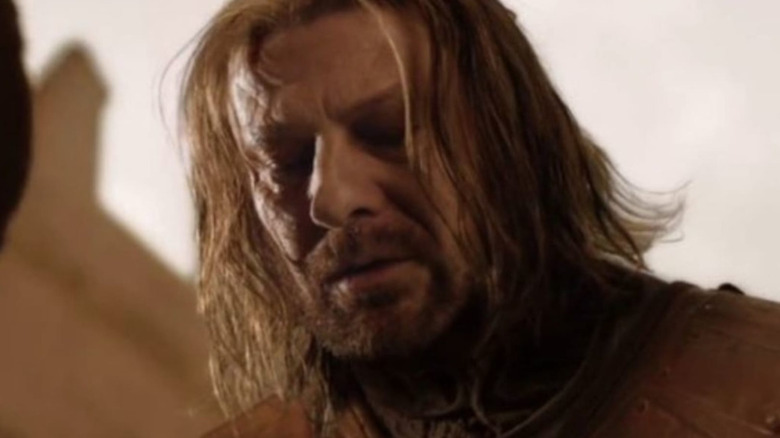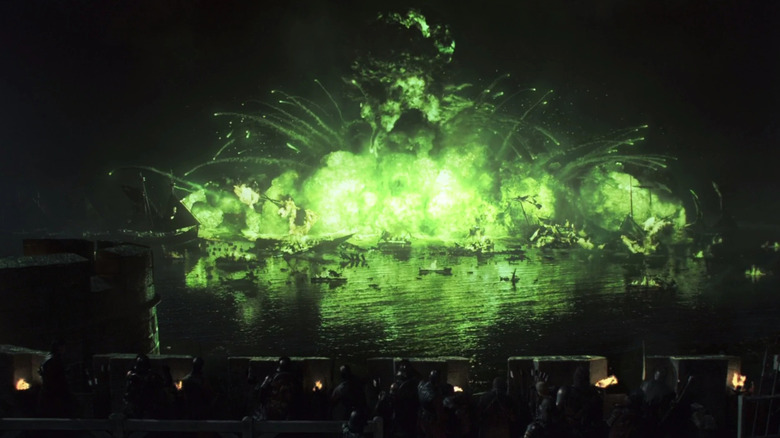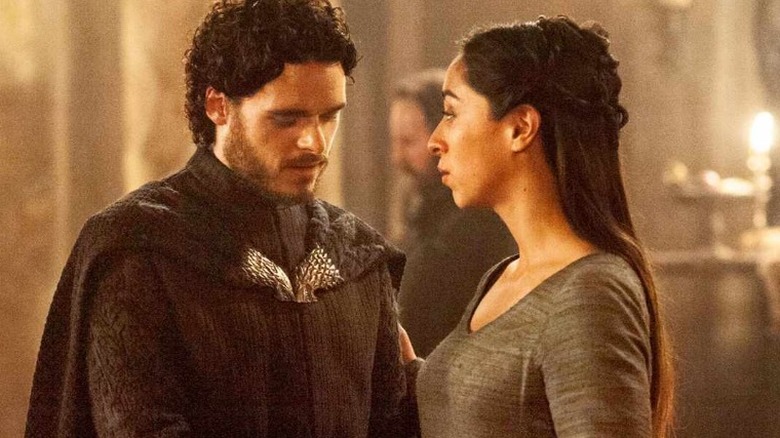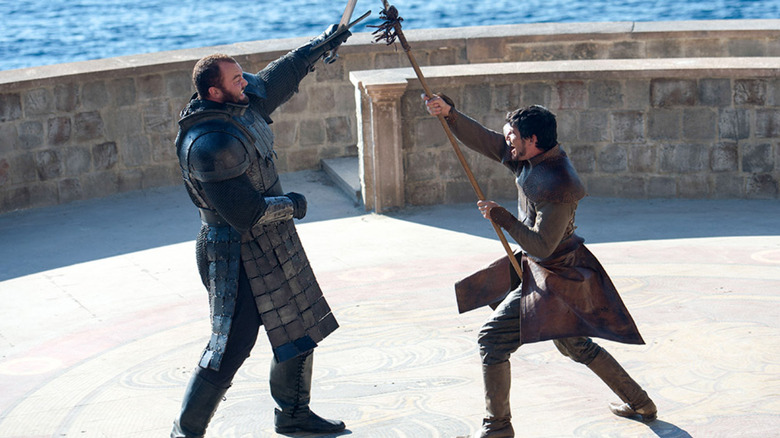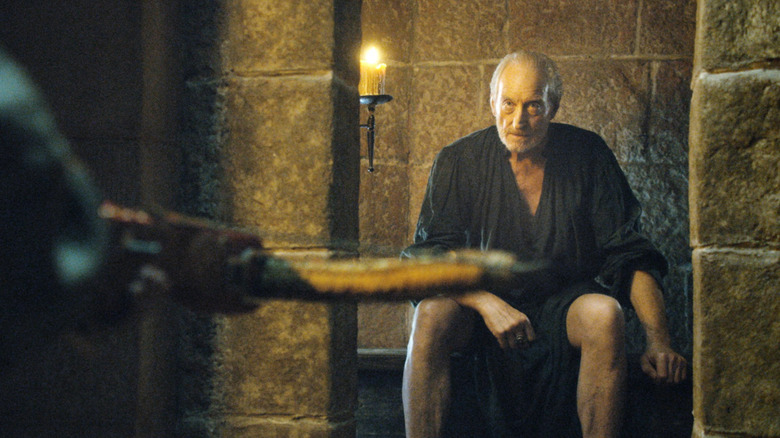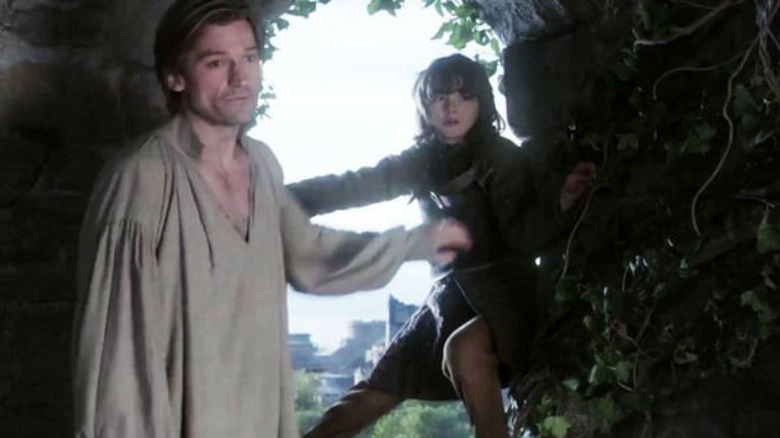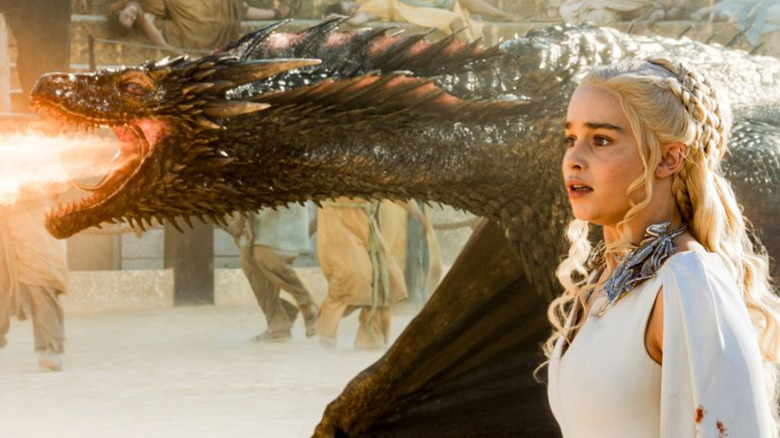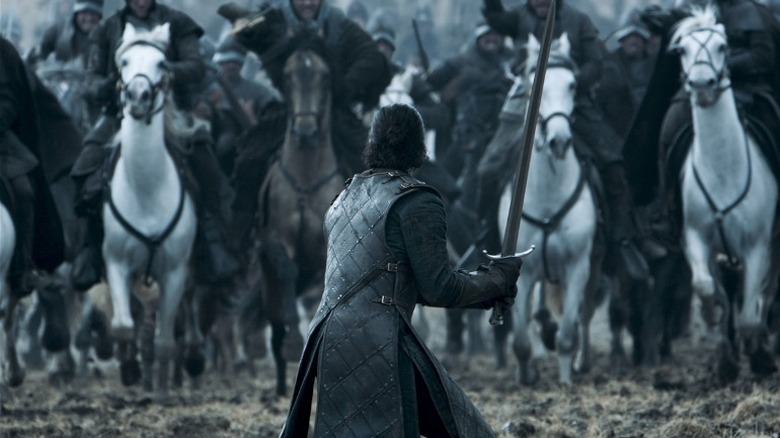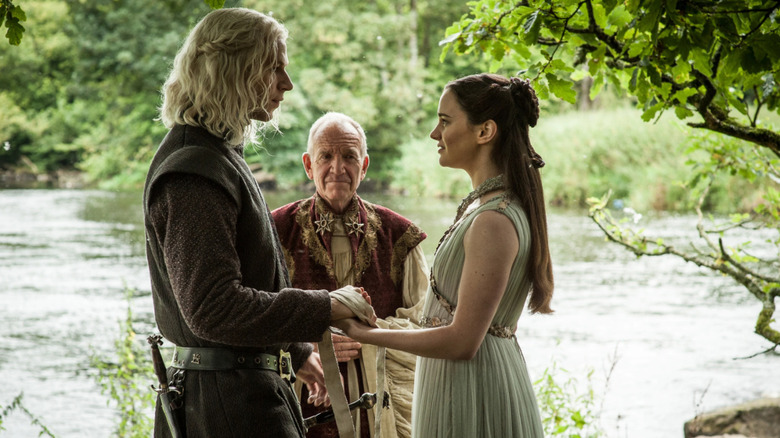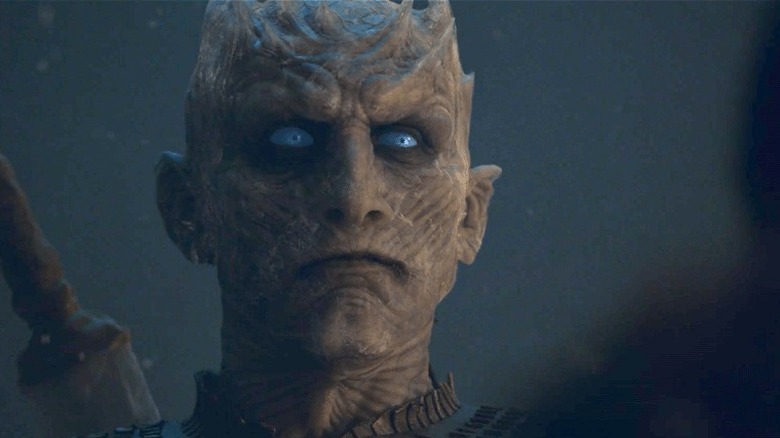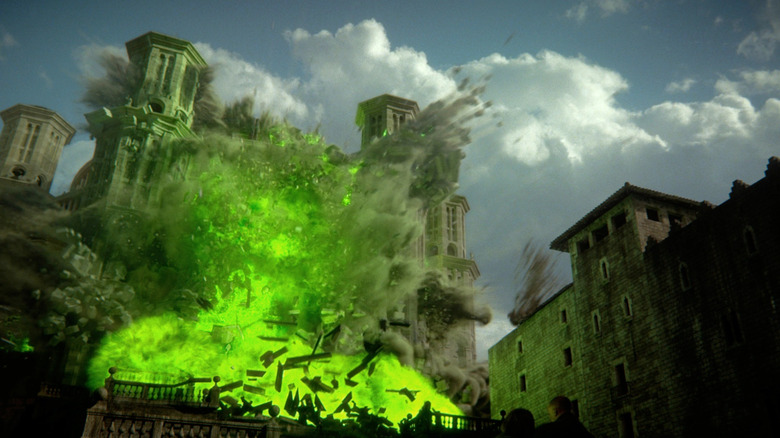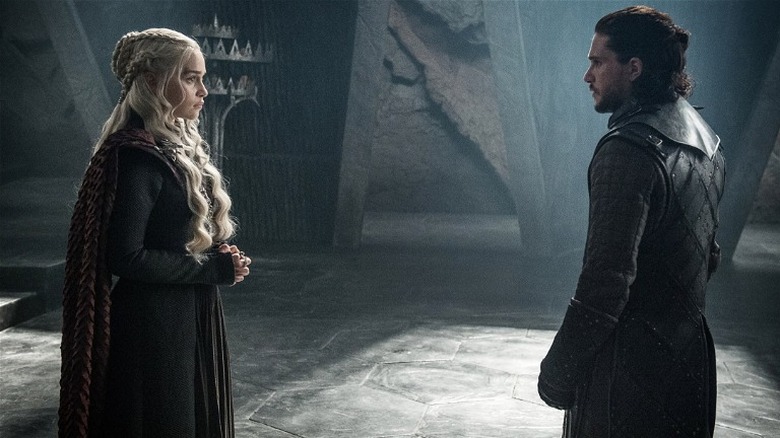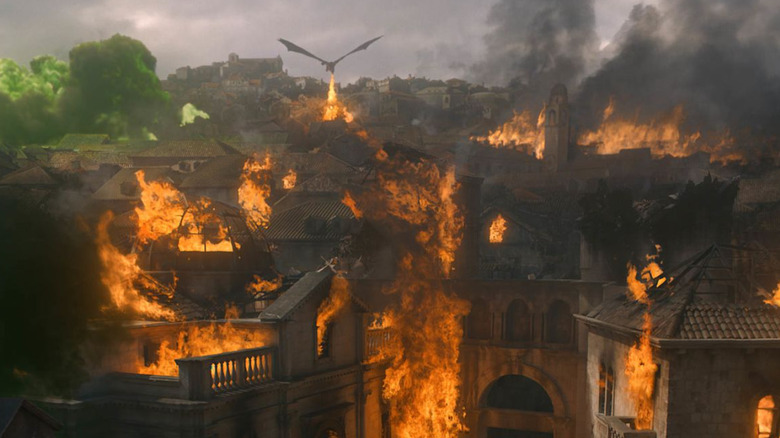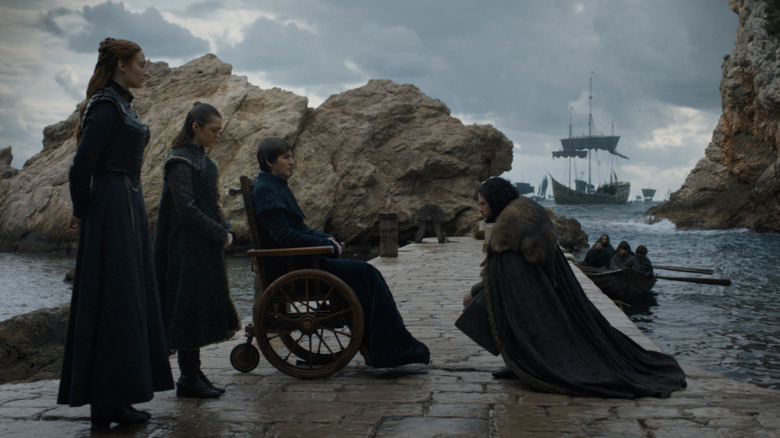Game Of Thrones Moments That Stunned Audiences
Over 8 seasons from 2011 to 2019, "Game of Thrones" took viewers on a hair-raising journey across the fictional continents of Westeros and Essos, fantasy worlds filled with all manners of strange creatures, from White Walkers to dragons and faceless assassins.
Based on the best-selling novels by George R.R. Martin, the "Thrones" series was hailed for its astonishingly complex world-building and production values. The series was also notable for bringing a new, gritty reality to the fantasy fiction genre. Gone was the family-friendly sheen of the J.R.R. Tolkien adaptations and the kid-friendly elements of Arthurian legends, replaced by Westeros, a land that felt authentically medieval in its cruelty and randomness and engagingly non-authentic in its giants, dragons and zombies.
"Game of Thrones" showcased the shockingly brutal side of magical kingdoms locked in battle with each other for thousands of years. Here, magic was no guarantee of a quick victory, and men and women of honor all-too-often paid for their high-mindedness in horrific ways. The show (and the novels it was based on) were renowned for shocking viewers with gruesome spectacle and unexpected twists.
Here are 14 of the most memorable, spoiler-heavy moments from the "Game of Thrones" TV series that still have fans reeling.
Ned Stark's death
The much-anticipated "Game of Thrones" HBO series started out in 2011 like a traditional fantasy story. There was an ancient kingdom ridden with magical and political problems, and an indifferent monarch unable or unwilling to help the common folk. Into this mess entered Lord Eddard "Ned" Stark (Sean Bean), the handsome head of House Stark, the Lord of Winterfell, Lord Paramount and Warden of the North, and later Hand of the King to King Robert I Baratheon (Mark Addy).
You'd think when a dude is this charismatic and possesses such a long list of titles, he's going to be one of the main heroes of the story. Clearly, he must be the noble knight who helps slay the dragon and bring peace to the kingdom. But in what ranks as one of the most shocking twists in TV history, Ned got his head sliced off in "Baelor" (Season 1, Episode 9), with nothing to show for his death but a Westeros further plunged into chaos and a family broken apart and scattered to the wind amidst a bloody, protracted war.
Ned's death was the first big signal to viewers that "Game of Thrones" was a new type of fantasy show, one where no character was safe. In later seasons, the show made good on this promise by gleefully dispatching one major character after another at the most unexpected moments. But it was the beheading of Ned Stark that set the tone.
The Battle of Blackwater
"Game of Thrones" was notorious for taking all the romance out of fantasy fiction, showing just how brutal and horrifying such a world locked in eternal war would be. Viewers got a taste during the events of "Blackwater" (Season 2, Episode 9), when director Neil Marshall ("The Descent") presided over an epic battle sequence that would ultimately rank among the best of the series.
In the episode, Stannis Baratheon (Stephen Dillane) sailed towards King's Landing with his army and was met with Lannister forces by Tyrion (Peter Dinklage). The resulting smackdown, marked by blood, tears and wildfire, would change many lives in the trajectory of the story.
What made the battle of Blackwater so thrilling to watch was that it was not a one-on-one fight between equal forces. Both sides tried every trick in the book to gain the upper hand, and there were plenty of double-crosses, last-minute escapes, and unexpected alliances forged in the heat of battle.
In the end, Stannis was unable to win King's Landing and claim the Iron Throne for himself. The Lannister army only became bigger and stronger after they were joined by House Tyrell. Tyrion's contributions to the war effort were dismissed by his family in favor of propping up the cowardly Joffrey, who actually had the arrogance to proclaim: "They [the people] know I saved the city. They know I won the war ... I broke Stannis on the Blackwater."
The Red Wedding
The creators of "Game of Thrones" took an almost perverse pleasure in constructing scenes of happiness and peace, and then crapping all over them with the most brutal twists that had fans gasping and screaming. The best example of this trope occurs with the so-called "Red Wedding" in "The Rains of Castamere" (Season 3, Episode 9), back when it still seemed like Ned's son Robb (Richard Madden) would be successful in gathering his army to overthrow the Lannisters and avenge his father.
Robb agreed to have his friend and ally Edmure Tullly (Tobias Menzies) wed Walder Frey's (David Bradley) daughter, so the Frey army would join Robb's forces in their battle against the Lannisters. It seemed like a bad idea to have a wedding at Walder's palace in such conflicted times, but Frey assured Robb and his other guests that he would abide by the sacred oath of the "guest right," ensuring no harm would come to the attendees of the wedding.
Once the wedding was finished and the guests sat together in bonhomie, Walder gave the signal for his men to spring the trap. The massacre began with the stabbing of a heavily-pregnant Talisa Stark (Oona Chaplin). The guest musicians then revealed themselves to be hired assassins, and they quickly fell upon Robb and his forces, overwhelming the Starks before they had a chance to defend themselves. Soon, the Stark family was in tatters. Roose Bolton (Michael McElhatton) personally drove a dagger through Robb's body with the declaration: "The Lannisters send their regards."
The Mountain vs. Oberyn Martell
Before he was the Mandalorian, Pedro Pascal played the (arguably even more badass) role of Oberyn Martell — aka the Red Viper of Dorne, a member of House Martell and the younger brother of Doran Martell and the late Elia Martell. It was Elia's death that prompted Oberyn to travel to Westeros with the intention of confronting her murderer, the towering behemoth of cruelty, Ser Gregor Clegane (Hafþór Júlíus "Thor" Björnsson).
Oberyn found the perfect opportunity to exact his revenge in "The Mountain and the Viper" (Season 4, Episode 8), when Tyrion was being sentenced to death and needed a champion to fight on his behalf after invoking the ancient rite of "trial by combat." Oberyn arranged with Tyrion to become his champion so that he could get a clear shot at fighting Ser Gregor, who would be representing House Lannister on the other side.
On the day of the battle, Oberyn showed up without any notable pieces of armor, wielding a single long staff with a blade at the end. Meanwhile, Clegane towered over Oberyn in his heavy armor and with his giant sword. What followed was a thrilling battle that showcased Oberyn's exceptional fighting skills, which gave him the upper hand. But just as victory and revenge seemed within his grasp, a momentary slip-up gave Clegane the opening he needed to bring down Oberyn by gouging his eyes out and bursting his skull. Whew, no wonder Pascal as the Mandalorian is so attached to his helmet.
Tyrion kills Tywin
Trying to find the worst person in the Lannister clan is a rather pointless exercise. The various members of the family delight in going to the worst lengths to accomplish their completely selfish interests, and the Lannister children learned such behavior first-hand at the knee of their father, Tywin (Charles Dance).
A full list of Tywin's crimes against his children (and the people of Westeros in general) would be way too long for a single article. Suffice it to say Tywin's concept of proper parenting was paying soldiers to assault Tyrion's then-wife as his son watched. But as awful as he was, Tywin was also one of the smartest, most powerful characters in the entire series.
Tywin bore a particular hatred towards Tyrion, seeing his dwarf son as a blot on the family name. To that end, Tywin never even tried to act fairly towards Tyrion, and was perfectly willing to let his son go to the gallows for a crime he did not commit. It was a cathartic moment for Tyrion — and the audience as well — when he confronted his father and shot him dead (on the toilet!) in a long-delayed moment of comeuppance in "The Children" (Season 4, Episode 10).
Bran's accident
"Game of Thrones" developed a reputation in Season 1 for "going there" in ways that other shows would not even think of attempting, subverting expectations of characters in fantasy stories, often in the most depressing ways possible. None were more heartbreaking, however, than the fate of Bran (Isaac Hempstead Wright) at the hands of Jaime Lannister (Nikolaj Coster-Waldau) in the very first episode of the show.
At the start of the episode, Jaime and his sister Cersei (Lena Headey) seemed like strong candidates for the roles of heroic protagonists. Both were ridiculously good looking, well-spoken, and intelligent, so the duo seemed set to play strong, positive roles in the series. Until, that is, seven-year-old Bran accidentally witnessed the brother and sister sleeping together. Desperate to conceal their secret, Jaime pushed the young boy out of the high tower to ensure his silence, leaving Bran permanently paralyzed from the waist down.
The shocking moment helped set the tone for what viewers could expect from the series moving forward — not even kids were safe in this world, and the worst of offenses would not necessarily be punished. It reflected a key development in the books, one Martin has cited as a moment that had a particularly strong impact on readers.
"I've had a million people tell me that was the moment that hooked them," Martin told Rolling Stone magazine in 2014. "Where they said, 'Well, this is just not the same story I read a million times before' ... People are thinking Bran is the hero of the story. He's young King Arthur. We're going to follow this young boy—and then, boom: You don't expect something like that to happen to him."
Dany's first flight
Women in general are not treated well in the world of "Game of Thrones." They are sold off like cattle to the highest bidder, used and abused as the men around them see fit. The tale of fan favorite Daenerys Targaryen (Emilia Clarke) began in a similar fashion, as she was married into the Dothraki tribe to aid her brother Viserys' dreams of conquering Westeros with a Dothraki horde.
But over time, Daenerys evolved into the show's most powerful character. In large part, this could be attributed to her designation as "Mother of Dragons," and control over three dragon "children" — as well as the ability to strike a badass pose while being surrounded by flames in any given situation. Daenerys' relationship with her dragons powered much of her individual narrative in the first few seasons of "Thrones," culminating in the triumphant moment when Dany rode the feisty Drogon for the first time in "The Dance of Dragons" (Season 5, Episode 9).
Over the course of the series, Dany and her dragons wrecked terrible destruction on those who displeased her. No matter how conflicted fans might have been over whom Dany saw as her "enemies" sometimes, or what many consider a lame twist that may have ruined the character at the end, those flying scenes were never anything less than breathtaking.
Jon vs. Ramsay
Just when fans thought they could not get more detestable characters in "Game of Thrones" than the Lannisters, along came House Bolton to make Tywin and his children look, in comparison, normal and well-adjusted. Possibly the most evil character in the entire show was Ramsay Bolton (Iwan Rheon), which was why fans were rooting for Jon Snow (Kit Harington) to teach Ramsay a lesson on the battlefield.
That time came in the iconic ninth and penultimate episode of the sixth season of the show. The episode had Jon and his army preparing to meet Ramsay's forces on the battlefield in a final, decisive fight to decide the future of Winterfell. The episode saw "Game of Thrones" reach its highest levels of dazzling cinematography and action set pieces as Jon and Ramsay's armies tried every trick in the book to gain the upper hand.
In the time since the episode's release, it has come to be considered among the greatest television episodes ever produced. "This battle works as a climactic moment for 'Game of Thrones' as a cultural event," Myles McNutt wrote for The A.V. Club in 2016, "selling us on the scale and ambition of the producers and their production teams, all who should be commended for the accomplishments from a technical perspective."
R and L make J
R+L=J. This cryptic cipher represents one of the most popular fan theories ever spawned by "Game of Thrones." The "J" in that equation represents Jon Snow, the character whose true parentage has remained the series' greatest mystery ever since George R. R. Martin wrote the first book in the series more than two decades ago.
Many wild theories regarding Jon's parentage were thrown around the internet by fans. Gradually, all the wild speculations coalesced into something that was starting to look more and more certain. The theory was that Jon was actually the secret lovechild of Rhaegar Targaryen (Wilf Scolding) and Lyanna Stark (Aisling Franciosi), and as such was the true heir to the Targaryen bloodline alongside Dany.
Such speculation was put to rest at the end of Season 6, however, when Bran went back in time to see Jon being born to Lyanna, who put him in the care of Ned Stark before passing away. Even though many hardcore fans had called the twist decades ago, the reveal still sent the fandom into upheaval. Especially given the "intimate" turn that Dany and Jon's relationship had taken.
The Night King's demise
"Game of Thrones" often focused so much on the political machinations of its main characters that you could overlook its existence as a magical fantasy series. But the Night King was always there to remind you of the show's supernatural elements in the most sinister ways possible, from raising an army of White Walkers to turning one of Dany's dragons into a minion.
As nasty as the human villains of the series were, the Night King was always set up as the main overarching final boss, an otherworldly abomination that sought to not only conquer Westeros but lay waste to the entire world and everything in it. After 7 seasons worth of build-up and anticipation for the epic final battle with the Night King, he was finally defeated in "The Long Night" ( Season 8, Episode 3) when Arya Stark (Maisie Williams) charged in to frame unexpectedly, stabbing the baddie with a Valyrian dagger.
The reaction to the Night King's demise were ... mixed, to say the least. Some fans felt his final appearance did not live up to 7-and-a-half seasons' worth of hype, others thought Jon Snow should have been the one to take down the Night King.
Kit Harington, for his part, agreed. "I was a bit pissed off, only because I wanted to kill the Night King," the actor told The Hollywood Reporter in 2019. "I think I felt like everyone else did, in that it had been set up for a long time, and then I didn't get to do it."
Cersei blows up the Sept
Cersei Lannister started out as a rather minor villain in "Game of Thrones." Sure, she enabled the maniacal regime of her son Joffrey (Jack Gleeson), and was getting horizontal with her brother on the side — but with all the power concentrated in the hands of the menfolk, there wasn't much opportunity for a female to do any serious damage. All that changed in later seasons of the show, as her young, inexperienced son Tommen (Dean-Charles Chapman) became the new leader of Westeros.
With Cersei playing a more active role in the running of their kingdom, one decision that came back to bite her was the reestablishment of the Faith Militant, a military order dedicated to defending the Faith of the Seven, a religious order abolished two centuries ago. The organization soon grew out of control, and Cersei herself was put on trial by the High Septon for her earlier crimes. This led to an infamous sequence in which Cersei was stripped naked and marched through the streets of Westeros.
She would get here revenge, however. Cersei showed all those around her (and the viewers at home) why she was not a woman to be trifled with in "The Winds of Winter" (Season 6, Episode 10), which had her arranging to blow up the building known as the Great Sept, where all the men and women who opposed Cersei had gathered together in one convenient-for-assassinations location.
Jon gets with Dany
Jon Snow and Daenerys Targaryen had been set up as the main heroes of "Game of Thrones" for several seasons by the time the two of them finally met; both were rare few characters who tried to act with honor and fairness, and seemed earnest in their attempts to help people instead of simply conquer and subjugate. Naturally, after many seasons of operating on opposite sides of the chessboard, fans were agog to find out what would happen when the two finally met in Season 7.
Right off the bat, there was natural chemistry between Jon and Dany, even when the former refused to bend the knee in front of the latter. Things heated up so quickly that in the finale of Season 7, Jon and Dany entered into a physical relationship as Tyrion watched mournfully from behind a half-closed door (seriously).
Unfortunately, it was soon revealed that Jon was also secretly a Targaryen, making him Dany's nephew and their relationship as questionable as whatever freakshow Jaime and Cersei had been running on the side since Season 1. Only "Game of Thrones" could have you cheering for two noble, heroic characters to get together, then leave you feeling icky for cheering on a nephew/aunt coupling.
Dany destroys King's Landing
Jon Snow was the closest thing to a classically-heroic figure in "Game of Thrones," but it became increasingly clear in later seasons that Daenerys was the one who would be the true game changer in the power politics of King's Landing and Westeros. Once she finally crossed the seas with her armies of the Unsullied, the Dothraki, and her three giant dragons, it seemed, everything would be upended.
Unfortunately, the final season of the show undid all the goodwill Dany had earned over the years by unexpectedly turning her into a villain. After a long, winding road to get to King's Landing (which included having two of her dragon children die) Dany decided she'd had enough. In a stunningly brutal display in "The Bells" (Season 8, Episode 5), Dany used her final dragon to burn all of King's Landing, incinerating untold numbers of innocent civilians.
The scene became possibly the most notorious moment in all of "Game of Thrones," leading fans to decry Season 8 as the worst of the entire series. At least Martin has offered some hope that his (still unpublished) final "Game of Thrones" novels might offer fans a better ending.
"That made it a little strange because now the show was ahead of me and the show was going in somewhat different directions," Martin explained to WTTW Chicago in 2021. "I'm still working on the book, but you'll see my ending when that comes out."
Bran the Broken becomes king
While previous seasons often moved at a glacially slow pace, the final season of "Game of Thrones" sometimes felt like the writers were taking a bullet train to their final destination, leaving disconcerted viewers scrambling to make sense of all the unexpected character arcs and resolutions flying past them. After the death of the Night King and Cersei and Dany's demise, the question went from who should rule Westeros in the ensuing power vacuum to another: who is even left?
To elect the new king, Tyrion posed a simple question to Westeros' new council of powerbrokers — and in true Tyrion fashion, answered it himself. "What unites people? Armies? Gold? Flags? Stories. There's nothing more powerful in the world than a good story ... And who has a better story than Bran the Broken? ... Who's better to lead us into the future?"
Seriously, Tyrion? Bran's story paled in comparison to Jon Snow (who led armies and assassinated the Mother of Dragons to save Westeros), Sansa (who survived untold horrors to become Queen of the North), Tyrion himself (who traveled all over the world and came back to Westeros a better, wiser man), as well as a half-dozen other characters that immediately come to mind.
Looking back at the beginning of the final season of "Thrones," there were so many more viable candidates for the throne that Bran's ascension might just be the biggest audience stunner — and audience disappointer — of all.

